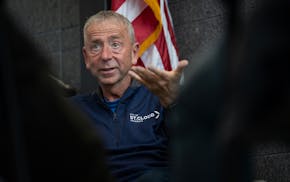On April 18, the Star Tribune's Hot Dish Politics blog described U.S. Sen. Al Franken's "push for the poor to have the right to nutritious food."
As Americans, we have the right to life, liberty and the pursuit of happiness. Access to nutritious and affordable food is crucial to living a healthy, happy life. Too many Americans struggle with this, and nearly 9 million seniors in this country face the threat of hunger.
One of the critical challenges that is often overlooked is senior hunger. It is a pervasive and growing problem for the nation. Research commissioned by the National Foundation to End Senior Hunger (NFESH) found that in 2011 in Minnesota, 8.59 percent of residents older than 60 faced the threat of hunger.
While Minnesota had the second-lowest rate of senior hunger among states in 2011, the number is still too high. That nearly one in every 11 older Minnesotans is counted among the "hidden hungry," as I call them, is a serious problem on its own. But looked at together with additional research NFESH released this year, it is even more significant. That research revealed that being at risk of hunger makes seniors sick.
The fact is that seniors who are food-insecure have worse health outcomes than seniors who are not. They are 50 percent more likely to be diabetic, twice as likely to report fair or poor general health, three times more likely to suffer from depression, 14 percent more likely to have high blood pressure, nearly 60 percent more likely to have congestive heart failure or have experienced a heart attack, and twice as likely to report having gum disease or asthma. The data are indisputable; in addition to being a disease itself, hunger is a health issue.
I applaud the senator for his commitment to increasing the availability and affordability of nutritious food for seniors in poverty, and I hope that he and other top officials will now elevate senior hunger to priority status. Not just in order to end the unacceptable scourge of hunger, but also to promote a healthier senior population.
Franken has taken the first step by recognizing that there is a problem. The next steps are acknowledging that solutions can be found and then being committed to working together to find them. The single necessary element for success is the courage to examine the current situation objectively to determine what is working and what is not, and then to implement change.
Enid Borden is founder, president and CEO of the National Foundation to End Senior Hunger.

Kudos to St. Cloud's longtime mayor
Readers Write: Ethnic studies curriculum, public notice laws, student protests


